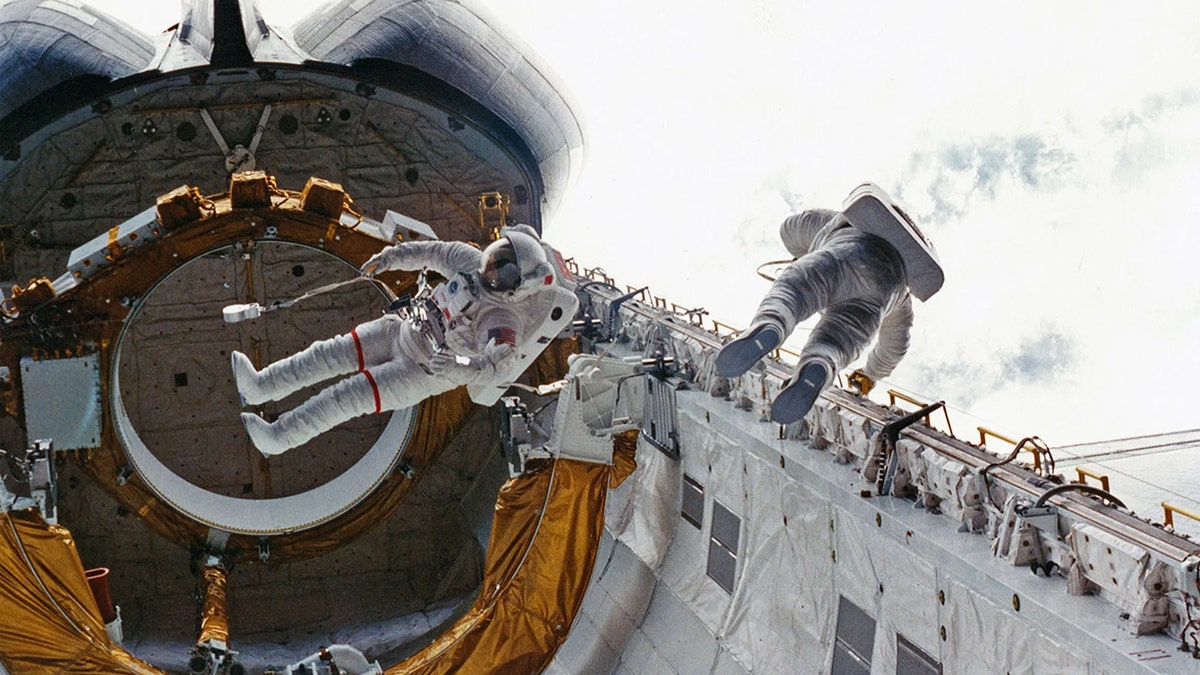
STS-6 crewmates Don Peterson (at right) and Story Musgrave perform the first shuttle-era spacewalk outside Challenger in 1983. (Credit: NASA)
Astronaut Donald Peterson, one of the first astronauts to perform a spacewalk from the space shuttle, died on Sunday at the age of 84.
Peterson's passing was first reported by the Association of Space Explorers, which noted his death on its Facebook page.
"So sad to report that we have lost another member of the astronaut family," the post reads. "Fair skies and tailwinds, Don."
Peterson joined NASA in September 1969, two years after the U.S. Air Force chose him to be a part of the planned Manned Orbiting Laboratory (MOL). The mission was eventually canceled, which led Peterson and his other trainees to joining the government space agency.
"You might think that there was a lot of— I mean, a bunch of screening and testing and all that. As far as I know, there was none," Peterson said, according to CollectSpace.com by way of Space.com. "There were fourteen people who were crew on the MOL program, and they took the seven youngest people."
Born in Winona, MS., Peterson enrolled at the United States Military Academy at West Point, where he graduated in 1955. From there, he joined the Air Force, becoming a second lieutenant, but it took him 14 years to eventually fly into space, being named to the maiden crew of the space shuttle Challenger.
Challenger had its first flight between April 4 and 9, 1983, led by STS-6 commander Paul Weitz. The shuttle undertook 10 missions, the last being the ill-fated STS-51-L mission on Jan. 28, 1986 that took the lives of all seven crew members, including teacher Christa McAuliffe, when it exploded just 73 seconds into its flight.
Three days into the first Challenger mission, Peterson and fellow mission specialist Story Musgrave made history, becoming the first astronauts to wear Extravehicular Mobility Unit (EMU) spacesuits and go for a spacewalk.
"That was fun," Peterson recalled, according to CollectSpace.
During the 4-hour, 10 minute extravehicular activity, both astronauts attached tethers to their suits and worked with the cradle that supported the Tracking and Data Relay Satellite, the first of its kind to launch. They used a wrench to manually lower it after it had been tilted forward to deploy.
"We had foot restraints, but it took so long to set them up and move them around, that we didn't want to do that. So I just held on with one hand, actually, to a piece of sheet metal, which is not the best way to hold on, and cranked the wrench with my other hand, and my legs floated out behind me," Peterson said. "As I cranked, my legs were flailing back and forth, like a swimmer, to react the load on the wrench."
Because of the movements made, the waist ring on Peterson's spacesuit rotated and the seal that kept it air tight popped out, causing Peterson to say he had an alarm.
"Story stopped what he was doing and came over. We were trying to check what was going on and the seal popped back in place and the leak stopped, so we went ahead and finished the EVA," Peterson said.
Peterson eventually resigned from NASA in November 1984, after he had spent a total of 5 days, 23 minutes and 42 seconds in space, going 2.1 million miles. STS-6 was his only spaceflight.
From there, Peterson consulted and worked with crewed aerospace operations, before stopping that work in 1993.
He is survived by his son, Don, two daughters, Jean and Shari and his brother Gil. His wife, Bonnie Ruth Love, passed away in 2017.








































